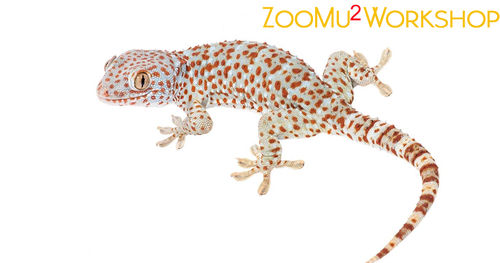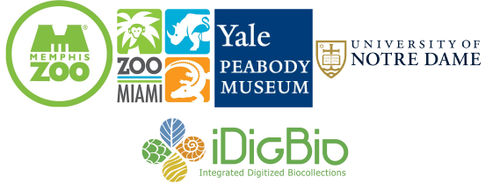ZooMu2: Further Linking and Leveraging Living Collections in Zoos with Traditional Natural History Collections: Difference between revisions
(→Agenda) |
|||
| (32 intermediate revisions by the same user not shown) | |||
| Line 1: | Line 1: | ||
{| class="wikitable" style="float:right; margin-left: 10px;" | {| class="wikitable" style="float:right; margin-left: 10px;" | ||
|- | |- | ||
!colspan="1" style="background:#D58B28;text-align:center;font-size:9pt |[[File:ZooMu2Gekko2.jpg|center|500px]] | |||
|- | |||
!colspan="1" style="background:#D58B28;text-align:center;font-size:9pt |[[File:Zoo Collections Webpage-1.jpg|center|500px]] | !colspan="1" style="background:#D58B28;text-align:center;font-size:9pt |[[File:Zoo Collections Webpage-1.jpg|center|500px]] | ||
|- | |- | ||
| Line 10: | Line 12: | ||
Organizers: [https://www.memphiszoo.org/our-team?staff=3884 Sinlan Poo (Research Scientist, Memphis Zoo)]; Steven Whitfield (Conservation and Research Specialist, [https://www.zoomiami.org/ Zoo Miami]); [https://peabody.yale.edu/collections/vertebrate-zoology/gregory-watkins-colwell Gregory Watkins-Colwell (Sr. Collections Manager, Yale Peabody Museum of Natural History)]; Alex Shepack (Post-Doc, Notre Dame University); Jillian Goodwin (iDigBio Conference Manager) | Organizers: [https://www.memphiszoo.org/our-team?staff=3884 Sinlan Poo (Research Scientist, Memphis Zoo)]; Steven Whitfield (Conservation and Research Specialist, [https://www.zoomiami.org/ Zoo Miami]); [https://peabody.yale.edu/collections/vertebrate-zoology/gregory-watkins-colwell Gregory Watkins-Colwell (Sr. Collections Manager, Yale Peabody Museum of Natural History)]; Alex Shepack (Post-Doc, Notre Dame University); Jillian Goodwin (iDigBio Conference Manager) | ||
<br> | <br> | ||
''This is an invited workshop but workshop recordings and presentations will be posted following the event for reference.'' | ''This is an invited workshop but workshop recordings and presentations will be posted following the event for reference.'' | ||
=Overview= | =Overview= | ||
Zoo and aquariums hold a wealth of biological resources in their live collections that are unique to these institutions and are complementary to that of traditional natural history collections in museums (Conde et al. 2019). As modern zoos transition from exhibits to conservation organizations, zoos are starting to focus on ways to enhance their contribution to the advancement of biological sciences (Loh et al. 2018, Rose et al. 2019, Association of Zoos and Aquariums 2020, Hvilsom et al. 2020). An obvious way to increase the value and impact of zoo collections is to increase their accessibility to researchers beyond the zoo system and strengthen the connections between institutions that hold live and preserved collections. | |||
<br>In May 2021, a virtual iDigBio-funded workshop ([https://www.idigbio.org/wiki/index.php/Linking_and_Leveraging_Biological_Collections:_Zoos_and_Natural_History_Museums “Linking and Leveraging Biological Collections: Zoos and Natural History Museums”]) was held to explore the similarities between zoos and museums as collection-based zoological institutions and the opportunities for the two types of institutions to work together more closely. Through a three-day workshop, researchers from zoos, museums, and academic institutions gathered to discuss benefits of zoo-museum collaborations, challenges within each type of institution, and potential ways that zoos and museums can work together to increase the capacity of both. The workshop was well-received and participants pointed to the need for further discussion on enhancing zoo-museum collaborations. | |||
<br>ZooMu2 will build on the momentum of the previous workshop and looks to distill the main areas within zoo-museum collaborations that should be tackled. These main areas will then be the focus of future, targeted efforts within the collections and scientific community. | |||
=Kumospace= | =Kumospace= | ||
We will use a website platform called Kumospace for coffee breaks and the meet & greet. Kumospace is similar to Zoom, but more casual and fun | We will use a website platform called Kumospace for coffee breaks and the meet & greet. Kumospace is similar to Zoom, but more casual and fun. <br><br> | ||
'''Pre-workshop Meet & Greet'''<br> | '''Pre-workshop Meet & Greet'''<br> | ||
When: Wednesday, February 16th, from 12:00pm-1:00pm EST, and the second will be Wednesday, March 16th, 12:00pm - 1:00pm EST.<br> | |||
Location: [https://www.kumospace.com/zoomu2 https://www.kumospace.com/zoomu2] | |||
= Google Docs for Break out Sessions= | |||
[https://www.idigbio.org/wiki/images/6/63/ZooMu2_-_Breakout_Room_List.pdf Breakout Room Lists] | |||
<br> | |||
''Please use these Google docs to provide a brief summary of your groups’ discussion during each discussion group. Your group may additionally use this document for general notes, if desired.'' | |||
<br><br> | |||
[https://docs.google.com/document/d/1H5z9dW1BLvUEZExt_fVxcWbktBJTNQUB-bXU369YOSQ/edit Higher educational pipeline, Conservation/Research at Zoo] | |||
<br><br> | |||
[https://docs.google.com/document/d/1ji-eceCWg10Y4rHCla1AR4Koc8NzQTVncoIGk25jZSY/edit Specimen transfer] | |||
<br><br> | |||
[https://docs.google.com/document/d/1eDBXnB1e_EVOQP3RvaQAP2MabWR8hQTXc_V4-gmqyYo/edit Linking animals under the Extended Specimen Concept] | |||
<br><br> | |||
[https://docs.google.com/document/d/11WKUtastyVrHgl8DblH7pying2buWJdGmTbKqT3HYI4/edit Database] | |||
=Agenda= | |||
{| class="wikitable" | |||
= | | align="center" style="background:#93eeee;"|'''Eastern Time''' | ||
| align="center" style="background:#93eeee;"|'''Duration''' | |||
| align="center" style="background:#93eeee;"|'''Day 1 (Tues 4/12)''' | |||
| align="center" style="background:#93eeee;"|'''Day 2 (Wed 4/13)''' | |||
| align="center" style="background:#93eeee;"|'''Day 3 (Thurs 4/14)''' | |||
| align="center" style="background:#93eeee;"|'''Pacific Time''' | |||
|- | |||
| align="center" style="background:#ffffc7;"|'''12:00''' | |||
| align="left" style="background:#ffffc7;"|30 mins | |||
| align="left" style="background:#ffffc7;"|Introduction & Background on ZooMu | |||
| align="left" style="background:#ffffc7;"|Big Group Discussions; Synthesis from the last day and goals for the day | |||
| align="left" style="background:#ffffc7;"|Big Group Discussions; [https://easyretro.io/publicboard/Ght64KdUYXZRhfDE7UhBqzSRpS42/c4f2f870-b641-4920-9cd1-c6146680005d EasyRetro] | |||
| align="left" style="background:#ffffc7;"|9:00 | |||
|- | |||
| align="center" style="background:#ffffc7;"|'''12:30''' | |||
| align="left" style="background:#ffffc7;"|90 mins | |||
| align="left" style="background:#ffffc7;"|Brief introductions | |||
| align="left" style="background:#ffffc7;"|Break out session 3: How can we deal with these road blocks | |||
| align="left" style="background:#ffffc7;"|Break out session 5: What are the next steps (1, 3, 5 year plan)? | |||
| align="left" style="background:#ffffc7;"|9:30 | |||
|- | |||
| align="center" style="background:#ffffc7;"|'''14:00''' | |||
| align="left" style="background:#ffffc7;"|60 mins | |||
| align="left" style="background:#ffffc7;"|Break out session 1: What is the vision of what we can accomplish with ZooMu linking up? | |||
| align="left" style="background:#ffffc7;"|[https://www.kumospace.com/zoomu2 Kumospace] | |||
| align="left" style="background:#ffffc7;"|Big Group Discussion | |||
| align="left" style="background:#ffffc7;"|11:00 | |||
|- | |||
| align="center" style="background:#f2f2f2;"|'''15:00''' | |||
| align="left" style="background:#f2f2f2;"|60 mins | |||
| align="left" style="background:#f2f2f2;"|Break | |||
| align="left" style="background:#f2f2f2;"|Break | |||
| align="left" style="background:#f2f2f2;"|Break | |||
| align="left" style="background:#f2f2f2;"|12:00 | |||
|- | |||
| align="center" style="background:#ffffc7;"|'''16:00''' | |||
| align="left" style="background:#ffffc7;"|90 mins | |||
| align="left" style="background:#ffffc7;"|Break out session 2: What are the issues that would be road blocks? | |||
| align="left" style="background:#ffffc7;"|Break out session 4: What type of resources (human, infrastructure, grants, workshops) are needed to address each area? | |||
| align="left" style="background:#ffffc7;"|[https://fiu.zoom.us/j/96316997649?pwd=aGlFeGdoTTMvcDBZdWdJMXpkS29XQT09 Wrapping up and moving forward] | |||
| align="left" style="background:#ffffc7;"|13:00 | |||
|- | |||
| align="center" style="background:#ffffc7;"|'''17:30''' | |||
| align="left" style="background:#ffffc7;"|30 mins | |||
| align="left" style="background:#ffffc7;"|Summary: Coming back together | |||
| align="left" style="background:#ffffc7;"|Summary: Coming back together | |||
| align="left" style="background:#f2f2f2;"| | |||
| align="left" style="background:#ffffc7;"|14:30 | |||
|- | |||
| align="center" style="background:#f2f2f2;"|'''18:00''' | |||
| align="left" style="background:#f2f2f2;"| | |||
| align="left" style="background:#f2f2f2;"|End | |||
| align="left" style="background:#f2f2f2;"|End | |||
| align="left" style="background:#f2f2f2;"| | |||
| align="left" style="background:#f2f2f2;"|15:00 | |||
|- | |||
|} | |||
= | =Resources= | ||
Latest revision as of 11:15, 14 April 2022
General Information
When: 12-14 April, each day from 12:00pm - 6pm EDT, 9am-3pm PDT
Where: Zoom
Organizers: Sinlan Poo (Research Scientist, Memphis Zoo); Steven Whitfield (Conservation and Research Specialist, Zoo Miami); Gregory Watkins-Colwell (Sr. Collections Manager, Yale Peabody Museum of Natural History); Alex Shepack (Post-Doc, Notre Dame University); Jillian Goodwin (iDigBio Conference Manager)
This is an invited workshop but workshop recordings and presentations will be posted following the event for reference.
Overview
Zoo and aquariums hold a wealth of biological resources in their live collections that are unique to these institutions and are complementary to that of traditional natural history collections in museums (Conde et al. 2019). As modern zoos transition from exhibits to conservation organizations, zoos are starting to focus on ways to enhance their contribution to the advancement of biological sciences (Loh et al. 2018, Rose et al. 2019, Association of Zoos and Aquariums 2020, Hvilsom et al. 2020). An obvious way to increase the value and impact of zoo collections is to increase their accessibility to researchers beyond the zoo system and strengthen the connections between institutions that hold live and preserved collections.
In May 2021, a virtual iDigBio-funded workshop (“Linking and Leveraging Biological Collections: Zoos and Natural History Museums”) was held to explore the similarities between zoos and museums as collection-based zoological institutions and the opportunities for the two types of institutions to work together more closely. Through a three-day workshop, researchers from zoos, museums, and academic institutions gathered to discuss benefits of zoo-museum collaborations, challenges within each type of institution, and potential ways that zoos and museums can work together to increase the capacity of both. The workshop was well-received and participants pointed to the need for further discussion on enhancing zoo-museum collaborations.
ZooMu2 will build on the momentum of the previous workshop and looks to distill the main areas within zoo-museum collaborations that should be tackled. These main areas will then be the focus of future, targeted efforts within the collections and scientific community.
Kumospace
We will use a website platform called Kumospace for coffee breaks and the meet & greet. Kumospace is similar to Zoom, but more casual and fun.
Pre-workshop Meet & Greet
When: Wednesday, February 16th, from 12:00pm-1:00pm EST, and the second will be Wednesday, March 16th, 12:00pm - 1:00pm EST.
Location: https://www.kumospace.com/zoomu2
Google Docs for Break out Sessions
Breakout Room Lists
Please use these Google docs to provide a brief summary of your groups’ discussion during each discussion group. Your group may additionally use this document for general notes, if desired.
Higher educational pipeline, Conservation/Research at Zoo
Specimen transfer
Linking animals under the Extended Specimen Concept
Database
Agenda
| Eastern Time | Duration | Day 1 (Tues 4/12) | Day 2 (Wed 4/13) | Day 3 (Thurs 4/14) | Pacific Time |
| 12:00 | 30 mins | Introduction & Background on ZooMu | Big Group Discussions; Synthesis from the last day and goals for the day | Big Group Discussions; EasyRetro | 9:00 |
| 12:30 | 90 mins | Brief introductions | Break out session 3: How can we deal with these road blocks | Break out session 5: What are the next steps (1, 3, 5 year plan)? | 9:30 |
| 14:00 | 60 mins | Break out session 1: What is the vision of what we can accomplish with ZooMu linking up? | Kumospace | Big Group Discussion | 11:00 |
| 15:00 | 60 mins | Break | Break | Break | 12:00 |
| 16:00 | 90 mins | Break out session 2: What are the issues that would be road blocks? | Break out session 4: What type of resources (human, infrastructure, grants, workshops) are needed to address each area? | Wrapping up and moving forward | 13:00 |
| 17:30 | 30 mins | Summary: Coming back together | Summary: Coming back together | 14:30 | |
| 18:00 | End | End | 15:00 |

